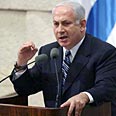
Bibi: Iran president more dangerous than Hitler
Likud chairman tells international counter terrorism conference ‘Hitler went out on global campaign first, and then tried to get nuclear weapons. Iran is trying to get nuclear arms first - therefore it is much more dangerous’
Speaking at the sixth International Counter Terrorism Conference, organized by the Interdisciplinary Center's (IDC) Institute for Counter Terrorism, Netanyahu told the audience: "Al-Qaeda can't develop nuclear weapons, while the militant Shiite movement is galloping forward towards developing nuclear terror."
He added: "Hitler went out on a world campaign first, and then tried to get nuclear weapons. Iran is trying to get nuclear arms first. Therefore from that perspective, it is much more dangerous."
Netanyahu said he was not downplaying the Holocaust. "Hitler was defeated because he could not develop weapons of mass destruction. But Iran stands close to developing nuclear weapons. Does the world understand? In Europe, where I returned from, there are glimpses of understanding," he said.
Preparing the ultimate weapon
"International terrorism is a mistaken term, not because it doesn't exist, but because the problem is international militant Islam. That is the movement… that operates terror on the international level, and that is the movement that is preparing the ultimate terror, nuclear terrorism," Netanyahu said.
The opposition chairman warned that if international terrorism goes nuclear, it could turn "the terror we know today to something marginal."
He described the "Iranian component" as the most "dangerous and fanatical component."
Netanyahu added that Sunni al-Qaeda and Shiite Iran were "competing for the leadership of the combative Islamist movement."
"The free world, when faced with fanatical ideologies, and when it understood the danger, eventually used its power to remove the danger. It won in the war against Nazism and communism in the Cold War. I believe that here too there will be a victory," Netanyahu said.
He described the 9/11 attacks on New York, using "two fully fuelled passenger 150 ton aircrafts to smash into the Twin towers" as the "equivalent of a tactical small nuclear bomb. But no one questions that if they had nuclear weapons, al-Qaeda would have wiped out Manhattan, and wiped out a good portion of Washington."
Describing the psychology of militant Islam as "pathological," Netanyahu said the difference between Islamism and communism was the willingness of Islamists to commit suicide, and the "love of death."
'Suicidal regime'
While the Soviet Union in history backed away from self destruction, Netanyahu said, the West may now be facing a "suicidal regime" in the form of Iran, which is willing to sacrifice itself for its ideology. Recognizing the danger was the first step in dealing with it, he added.
Professor Raymond Tanter, Founder of the Iran Policy Committee, expressed hope that the Iranian people and anti-regime movements would themselves topple the Iranian regime, which he branded as "fascist."
"I think military action is highly problematic, diplomacy is failing, sanctions won't work either," Tanter said. He argued that Iranian opposition movements should be removed from the terror list, and be allowed to work freely to bring down the Iranian government.
The conference on global terrorism attracted representatives of militaries and governments from around the world, including Berham A. Sahukar, a retired Indian army Lieutenant Colonel from the Parachute Regiment.
Speaking to Ynetnews, Sahukar addressed some of the similar threats faced by both India and Israel.
"The major threat that we both face, though it is similar, but different in a way, is the threat of Islamic radicalism, the Islamist threat of terrorism, and the constraint of countering both these threats as democracies – both Israel and India are thriving secular democracies, which value human rights to a very great extent. We have an additional constraint, in that we have a very large Muslim population, the second largest Muslim population after Indonesia, and most of them are moderate Muslims, who we don't want to radicalize at all."
Sahukar added that both Israel and India faced the threat of non-conventional terrorism, either biological, chemical, or nuclear, coming from "Someone setting off something in Kashmir or even in Delhi. Many Islamist groups operating from Pakistan view India, the US, and Israel as one entity against Islam. Many of the Pakistani terrorist group websites show the flags of India, Pakistan, and Israel being skewered by the sword of Islam."
Addressing the threat posed by al-Qaeda to Israel, Colonel (Res.) Lior Lotan, Executive Director of the ICT, said that while al-Qaeda initially chose to attack the "far enemy," the United States, it has now set its sight on the near enemy, moderate Arab states and Israel: "The capability is there. The motivation is increased. Most importantly, Israel as a target came from the bottom to being a top priority. I say to the Israeli authorities, we should never fear to deal with this, and we never deal with it out of fear."










